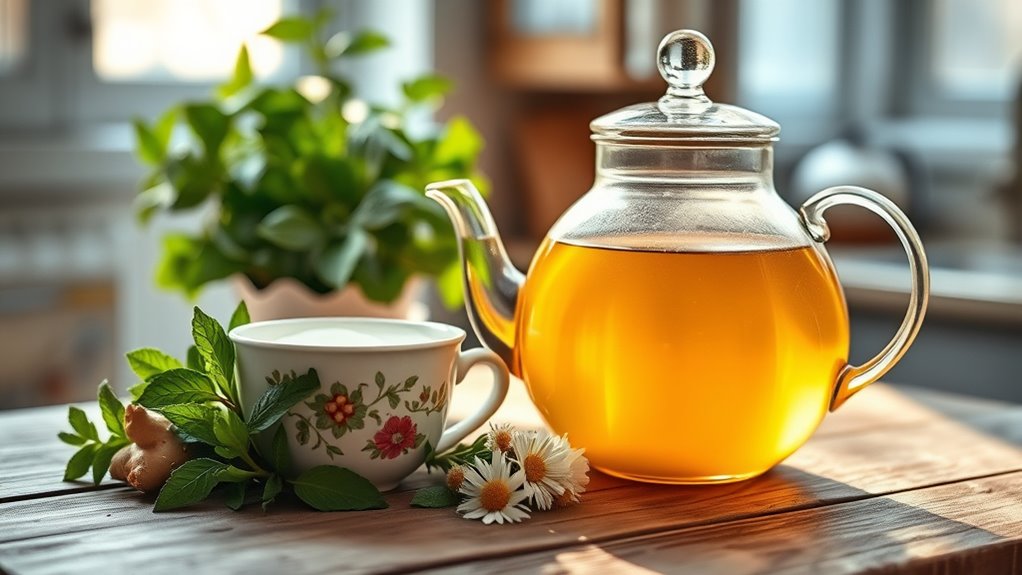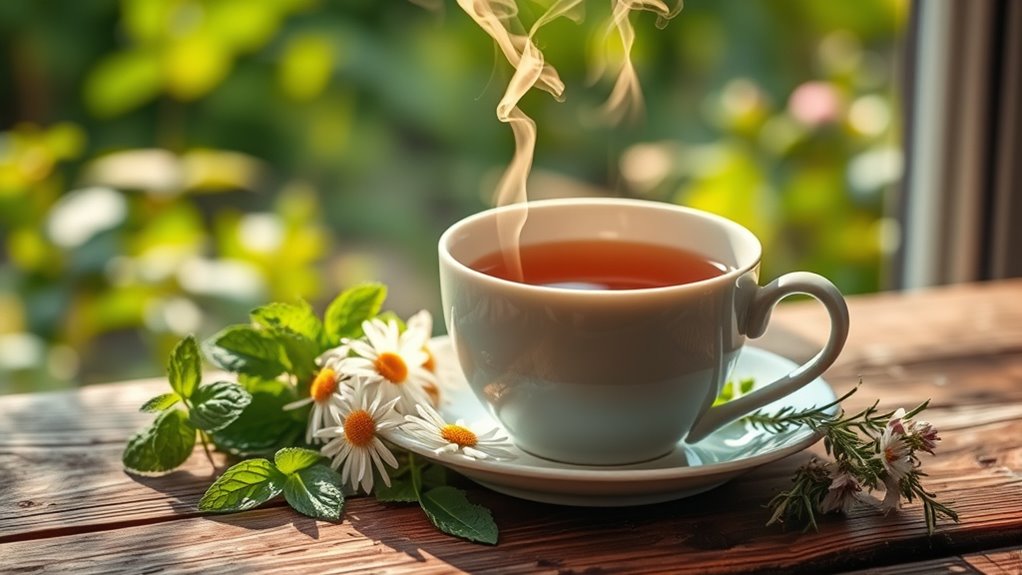Herbal tea can be soothing during pregnancy, but not all options are safe. You should be cautious, as some herbs may affect your health and your baby’s development. Ginger and peppermint are generally safe and can help with nausea, while chamomile may aid sleep. However, avoid teas like parsley and sage due to potential risks. Always consult your healthcare provider before trying new herbal teas to ensure the best choices for you and your baby. There’s more to discover about this topic.
Key Takeaways
- Consult your healthcare provider before consuming any herbal teas during pregnancy due to potential risks and interactions.
- Ginger and peppermint teas are generally considered safe and may help alleviate nausea.
- Chamomile and lemon balm teas can promote better sleep and reduce anxiety, but should be consumed in moderation.
- Avoid herbal teas like parsley, sage, pennyroyal, comfrey, and aloe due to their potential risks and toxicity.
- Monitor caffeine intake from all sources, as high consumption can pose risks during pregnancy, with herbal teas typically being low in caffeine.

When you’re pregnant, you might wonder if herbal teas are safe to consume. While many people enjoy herbal teas for their natural flavors and purported health benefits, the truth is that their safety during pregnancy can be quite complex. Herbal teas aren’t strictly regulated, which means their ingredients can vary widely and their effects on both you and your baby can be uncertain. Some herbal teas contain active ingredients that might interact with medications or affect fetal development, raising important safety concerns.
When considering herbal teas, it’s essential to think about caffeine content. While caffeinated options like green tea can be enjoyed in moderation, you should still limit your intake to avoid potential risks associated with high caffeine consumption.
On the other hand, certain herbal teas are generally safer than others. For example, ginger tea is often recommended to alleviate nausea, though you should consume it in moderation to avoid any adverse effects. Peppermint tea is another option that’s generally considered safe, but it’s advisable to be cautious, especially in early pregnancy, as it might stimulate menstrual flow. Different parts of the plant can be used in herbal teas, which adds to the complexity of understanding their safety.
There are, however, herbal teas that you should steer clear of altogether. Parsley tea is known to pose risks of miscarriage, while sage tea has concentrated forms linked to high blood pressure and miscarriage. Additionally, pennyroyal tea is toxic, and comfrey tea contains harmful compounds, making them unsuitable during pregnancy. Aloe tea is also not recommended due to potential toxicity and insufficient safety data.
It’s crucial to consult your healthcare provider before adding herbal teas to your routine during pregnancy. They can help you navigate the complexities of herbal safety, especially since some compounds can cross the placenta and enter breast milk, potentially impacting your baby’s health.
Furthermore, herbal teas may interact with prescription medications, complicating your pregnancy management. Despite the risks, herbal teas can offer benefits. Ginger and peppermint can help with nausea, while chamomile may improve sleep quality and reduce anxiety. Lemon balm is another option for anxiety relief, though research on its safety during pregnancy is limited.
Ultimately, while some herbal teas can be beneficial, it’s vital to approach them with caution and seek guidance from your healthcare provider to ensure you’re making safe choices for you and your baby.
Frequently Asked Questions
Can Herbal Tea Replace Regular Tea or Coffee During Pregnancy?
Yes, herbal tea can replace regular tea or coffee during pregnancy since many herbal options are caffeine-free. This makes them a safer choice for managing your caffeine intake.
However, it’s essential to choose your herbal teas wisely and consume them in moderation. Some may carry risks or lack sufficient safety studies.
Always check labels for unlisted ingredients and consult your healthcare provider to ensure you’re making the best choice for your health.
Are There Any Herbal Teas That Can Induce Labor?
You might be wondering if any herbal teas can actually induce labor.
Well, there are a few that get mentioned quite often. For example, red raspberry leaf tea‘s been talked about for its potential to tone the uterus, while chamomile tea has some evidence suggesting it could help in post-term pregnancies.
But remember, the effectiveness varies, and it’s crucial to consult your healthcare provider before trying any of these teas for labor induction.
How Much Herbal Tea Is Safe to Consume While Pregnant?
When considering how much herbal tea you can safely consume, moderation is key.
Limiting yourself to 1 or 2 cups per day helps minimize exposure to active ingredients. It’s wise to rotate different herbal teas, avoiding excessive intake of any single herb.
Always monitor for unusual side effects, and check labels for unwanted ingredients. Consulting your healthcare provider before introducing herbal teas into your routine is also a smart move for your peace of mind.
Are There Specific Herbal Teas to Avoid During Pregnancy?
You should avoid certain herbal teas during pregnancy due to potential risks.
Cinnamon, chamomile, fenugreek, licorice, and nettle teas can pose various dangers, including inducing contractions or affecting fetal development.
These teas may contain high concentrations of active ingredients or harmful compounds.
It’s crucial to consult your healthcare provider about any herbal tea you’re considering.
Always prioritize safety and be mindful of what you consume during this important time.
Can Herbal Tea Help With Pregnancy-Related Nausea?
Did you know that about 70% of pregnant women experience nausea?
Herbal teas like ginger can be a helpful remedy for this common issue. Ginger tea‘s antiemetic properties make it a popular choice to alleviate nausea. However, it’s essential to consume it in moderation and consult your healthcare provider before trying it.
Other options like peppermint or chamomile might also provide relief, but be cautious of their safety during pregnancy.
Conclusion
In the delicate dance of pregnancy, sipping herbal tea can be a soothing ritual, but it’s wise to tread carefully. While some herbal blends offer gentle comfort, others might not be the best companions for your journey. Always consult your healthcare provider before indulging. By choosing wisely, you can enjoy your warm cup of tranquility, nurturing both yourself and your little one, ensuring that each sip contributes positively to this beautiful chapter of life.









